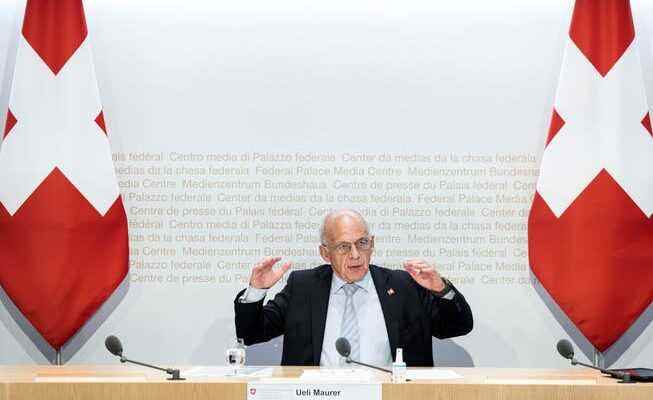The house blessing in Bern is crooked. Finance Minister Ueli Maurer and Defense Minister Viola Amherd are at odds. On Wednesday, the dispute reached a new high in public.
At the media conference on the 2023 budget, Finance Minister Ueli Maurer unabashedly made a foray into security policy.
Nobody knows how long Ueli Maurer will remain on the Federal Council, maybe not even himself. But one thing is certain: he and Viola Amherd will no longer be friends. The SVP Federal Council and his colleague from the Mitte party clashed violently last year in the turbulence surrounding the procurement of the new combat aircraft. For weeks now they have been engaged in an uncooperative long-distance duel over the army budget.
The dispute reached a new high on Wednesday, following the last Federal Council meeting before the holidays. Finance Minister Maurer appeared in front of the media to present the federal budget for 2023. Up to the question and answer session, everything went as usual. Then Maurer was asked by a journalist about the army’s budget, which the Federal Council has to increase massively on the orders of Parliament. Annual spending on national defense is expected to increase from CHF 5.2 billion today to CHF 6.4 billion by 2026.
The ex-Secretary of Defense
And suddenly it seemed as if Ueli Maurer, the defense minister he had been until 2015, was awakening to new life. Instead of talking about billions, he suddenly spoke about military matters. He unabashedly switched from the field of finance to security policy, the domain of his colleague Amherd. Among other things, Maurer raised the heretical question of how a militia army would cope with the “very complex systems” that the Defense Department (VBS) wants to acquire.
However, Maurer caused more trouble with another statement. He literally put it on record: “I don’t assume that the army will have projects that are ready for procurement in the short term.” In doing so, he precisely addressed the main point of contention: is the DDPS in a position at all to invest the many billions that Parliament wants to make available to it in a useful manner within a reasonable period of time? Yes, says the DDPS.
Maurer, on the other hand, obviously has doubts – and doesn’t feel like hiding them. The more benign part of his remarks included references to the complexity and length of time involved in the case of military procurement projects. However, he also said this: he was not sure whether the DDPS was clear about what could be procured in the next ten years. And: “Personally, I have the feeling that it’s easy to overestimate being able to spend all that.”
“Not correct”
In the DDPS, the verbal assault by the former head of department naturally does not go down well at all. The department does not want to issue an official statement, but on the merits it clearly contradicts Maurer’s statements: It is wrong that there are no projects ready for procurement in the short term, says communications chief Renato Kalbermatten. In recent years, the army has had to postpone projects that are now to be implemented quickly without any lead time.
Kalbermatten cites two examples: Projects to modernize the ground forces and cyber defense should have been postponed. And: With the last army reform, which was initiated under VBS boss Maurer, it was decided to have full equipment. To date, this has not yet been fully implemented.
Mutual corrigenda
It is not every day that a department corrects statements made by another Federal Councillor. In this case, however, it is not a premiere. It all started when Amherd told parliament in May that the planned increase in the army budget could be done almost painlessly, without austerity measures and without tax increases. This bold thesis caused irritation in the finance department. Two weeks later, Ueli Maurer addressed the public corrigendum in an interview: The planned increase currently has no place in the budget.
For a short time it actually looked as if Amherd had accepted the financial realities. This week, however, she fell back into the old pattern in an interview with “Nebelspalter”: It’s not true that anyone has to save because of these decisions, she said.
What does “saving” mean?
The question is what Amherd means by “saving”. If it means that the federal government is spending less than previously planned, for example on the railways or social security, then the statement was refuted on Wednesday. The figures in the new financial plan are clear: the growth in the army budget is making a significant contribution to the fact that federal spending from 2024 to 2026 will be higher than the debt brake allows.
Budget tug-of-war will continue into December. However, one has to worry even more about the mood in the Bundesrat than about the financial situation of the federal government.
